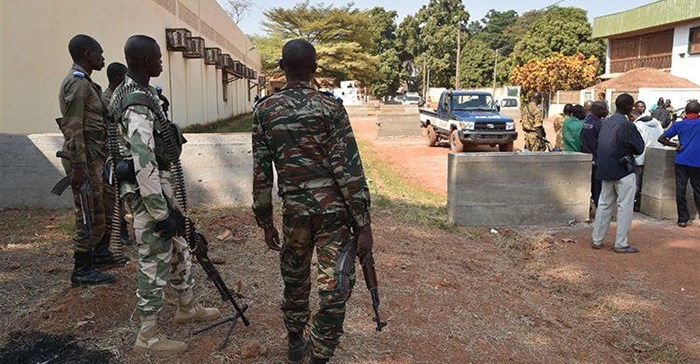Authorities in the Central African Republic should investigate police who allegedly assaulted two French reporters and ensure that journalists can work freely in the country, the Committee to Protect Journalists said.

Central African Republic gendarmes and police officers are seen on January 2, 2016, in Bangui. Police in Bangui allegedly assaulted two French reporters from AFP recently. Credit: CPJ/AFP/Issouf Sanogo.
On June 15, officers from the Central Office for the Suppression of Banditry, in the capital city of Bangui, arrested and assaulted Charles Bouessel and Florent Vergnes, French nationals working as reporters for news agency Agence France-Presse, while the journalists were covering a protest by a banned opposition group, according to a report from their employer and Bouessel, who spoke to CPJ via phone.
The officers also confiscated sound equipment, cameras, and personal effects from the journalists, and broke one of their cameras, according to Bouessel. The journalists were held for more than six hours, the AFP report said.
"It is unacceptable to arrest and assault journalists for simply doing their jobs covering a newsworthy event," said Angela Quintal, CPJ's Africa program coordinator, in New York. "We urge authorities in the Central African Republic to stop censoring the media and recognise that they do not have the power to decide what should or shouldn't be covered."
When police moved to disperse the protest, officers prevented the journalists from leaving the area, according to the AFP report. Bouessel told his employer that officers threw his camera to the ground, slapped him in the head, and punched him. Vergnes told AFP that an officer grabbed him by the throat, slapped him, and hit him in the back with a Kalashnikov rifle.
The journalists were then arrested and questioned for six hours, the AFP report said.
Bouessel told CPJ that he and Vergnes were initially charged with illegally covering a prohibited protest, and then charged with participating in the banned demonstration. Yesterday, prosecutors told the journalists that all charges have been dropped, Bouessel said.
Flavien Mbata, the country's justice minister, told CPJ by phone that he had intervened and had the charges against the journalists dropped.
However, Mbata stood by the arrests of the journalists, saying that Bouessel and Vergnes knew the protest was banned and should not have covered it. The government released a statement on Twitter before the protest, stating that it was banned and prohibiting coverage.
"Central African and foreign journalists in Bangui have respected this warning, unlike the two AFP journalists," Mbata said. He insisted to CPJ that the journalists' equipment will be returned.
AFP's Africa director, Boris Bachorz, said in an email to CPJ that the arrests and assaults were unjustifiable. AFP is seeking assurances from authorities in the Central African Republic that the journalists, and media in general, will be allowed to report freely, he said.












